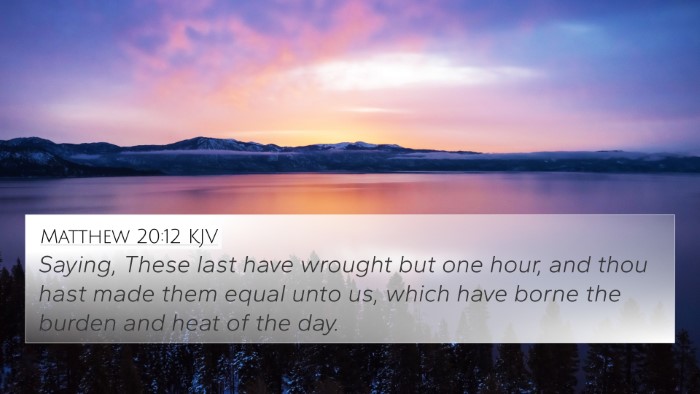Understanding Luke 12:55
Verse: Luke 12:55 - "And when you see the south wind blow, you say, There will be heat; and it cometh to pass." (KJV)
Overview of the Verse
This verse is a part of a larger discourse where Jesus teaches about discernment and the ability to interpret signs in our natural world. Here, Jesus highlights the common human capacity to read the signs of the weather to anticipate events, illustrating a deeper truth regarding spiritual discernment.
Commentary Insights
This section combines insights from respected public domain commentaries, providing a comprehensive understanding of Luke 12:55.
Matthew Henry's Commentary
Matthew Henry emphasizes the importance of discernment in recognizing the signs of the times. He suggests that just as people can predict weather changes by observing natural signs, they should also be able to interpret spiritual signs. This verse serves as a reminder of the necessity of spiritual awareness and understanding the implications of current events in light of Scripture.
Albert Barnes' Notes
Albert Barnes notes that Jesus challenges His audience by comparing their skill in weather forecasting with their inability to recognize significant prophetic signs. He points out that if people are so astute in worldly matters, they should apply the same wisdom to their spiritual lives. Barnes highlights the critical nature of being prepared for spiritual truths and the urgency of heeding the signs of Christ's coming kingdom.
Adam Clarke's Commentary
Adam Clarke elaborates on the idiomatic expression of reading the weather. He underscores that the Jews in Jesus' time were familiar with such expressions, reinforcing a cultural understanding. Clarke suggests that this metaphor indicates the folly of not recognizing the clearer spiritual truths before them, especially when those truths had far greater consequences than mere weather changes.
Bible Verse Cross-References
- Matthew 16:3: "And in the morning, It will be foul weather today: for the sky is red and lowering. O ye hypocrites, ye can discern the face of the sky; but can ye not discern the signs of the times?"
- 1 Chronicles 12:32: "And of the children of Issachar, which were men that had understanding of the times, to know what Israel ought to do."
- Luke 12:54: "And he said also to the people, When ye see a cloud rise out of the west, straightway ye say, There cometh a shower; and so it is."
- Romans 13:11: "And that, knowing the time, that now it is high time to awake out of sleep: for now is our salvation nearer than when we believed."
- Ephesians 5:15-16: "See then that ye walk circumspectly, not as fools, but as wise, Redeeming the time, because the days are evil."
- Colossians 4:5: "Walk in wisdom toward them that are without, redeeming the time."
- 1 Thessalonians 5:1-2: "But of the times and the seasons, brethren, ye have no need that I write unto you. For yourselves know perfectly that the day of the Lord so cometh as a thief in the night."
Thematic Bible Verse Connections
This verse speaks to the broader theme of discernment in both the natural and spiritual realms. It invites believers to engage in:
- Interpreting Biblical signs: Understanding prophetic nuances in Scripture.
- Applying wisdom: Using knowledge gained from the world to decipher spiritual truth.
- Being prepared: Cultivating readiness for the judgments and acts of God based on current signs.
Cross-Referencing Biblical Texts
Cross-referencing relevant texts enhances our understanding of Luke 12:55. A closer look at related verses can help identify links between different parts of Scripture, allowing for greater comprehension of God's message throughout the Bible. The tools for Bible cross-referencing can help in analyzing how Jesus’ teachings correlate with those of the Old Testament and how they serve as a continuity of God's intention.
Conclusion
In summary, Luke 12:55 challenges believers to sharpen their discernment skills, drawing parallels between understanding natural signs and recognizing spiritual truths. Believers are encouraged to use the resources of cross-referencing Biblical texts to deepen their study and preparation for the realities of their faith.




